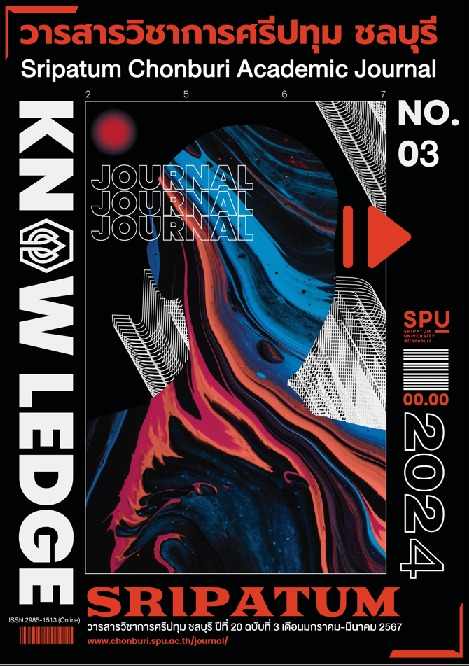EVENT MARKETING AND THE IMAGE OF THE ORGANIZATION TOWARDS THE ATTITUDE AND CONSUMERS PURCHASE DECISION ON CONDOMINIUMS: A CASE STUDY OF KAVE CONDO
Keywords:
Event Marketing, Image of the Organization, Purchase Decision on CondominiumsAbstract
The objectives of this research were to study 1) the factors of event marketing that affected the image of the organization, 2) the factors of event marketing that affected consumers’ attitudes, 3) the factors of the image of the organization factors that affected consumers’ attitudes, and the attitude factors that influenced consumers’ purchasing decisions. The samples of the research selected by Convenience Sampling Method were 400 Campus Condo consumers at Kave Condo, who answered an online Google Form questionnaire sent through the Line platform. The data were analyzed by the Frequency, Percentage, Mean, Standard Deviation and Stuctural Model on SmartPLS program. The research findings were as follows: 1) Event marketing affected consumers’ attitudes, 2) Event marketing did not affect the image of the organization, 3) The image of the organization affected consumers’ attitudes, and 4) Attitudes influenced consumers’ purchasing decisions at the .05 level of statistical significance.
References
กัลยา วานิชย์บัญชา. (2540). การวิเคราะห์สถิติ: สถิติเพื่อการตัดสินใจ (พิมพ์ครั้งที่ 3). กรุงเทพฯ: สำนักพิมพ์แห่งจุฬาลงกรณ์มหาวิทยาลัย.
ชยางกูร กิตติธีรธำรง. (2566). เจาะตลาด Campus Condo อะไรคือกลยุทธ์มัดใจกำลังซื้อหน้าใหม่วัยนักศึกษา (ออนไลน์). เข้าถึงได้จาก: https://propholic.com/prop-talk/เจาะตลาด-campus-condo-อะไรคือกลยุท/#google_vignette [2566, 5 กันยายน].
เบญจมาภรณ์ พึ่งรุ่ง และคม คัมภิรานนท์. (2564). การรับรู้ภาพลักษณ์สุขสยาม ณ ไอคอนสยาม ที่ส่งผลต่อทัศนคติของลูกค้าชาวไทย. การค้นคว้าอิสระ ศิลปศาสตรมหาบัณฑิต วิทยาลัยนวัตกรรม มหาวิทยาลัยธรรมศาสตร์.
มติชนออนไลน์. (2566). “แอสเซทไวส์” ตะลุยคอนโดแคมปัส บ้านหรู ลั่นรายได้ 1 หมื่นล้านไม่ไกลเกินเอื้อม (ออนไลน์). เข้าถึงได้จาก: https:// www.matichon.co.th/economy/news_3801905 [2566, 10 ตุลาคม].
วรรณวิศา ศรีคำ. (2562). ปัจจัยที่มีผลต่อความตั้งใจซื้อคอนโดมิเนียมที่เป็นมิตรต่อสิ่งแวดล้อมโดยใช้โมเดล การตัดสินใจ. การค้นคว้าอิสระมหาบัณฑิต สาขาวิชาบริหารธุรกิจ, คณะพาณิชยศาสตร์และการบัญชี มหาวิทยาลัยธรรมศาสตร์.
สุรพงษ์ คงสัตย์ และธีรชาติ ธรรมวงค์. (2551). การหาค่าความเที่ยงตรงของแบบสอบถาม (IOC) (ออนไลน์). เข้าถึงได้จาก: https://www.mcu.ac.th/article/detail/14329 [2566, 12 ธันวาคม].
เสรี วงษ์มณฑา. (2542). การวิเคราะห์พฤติกรรมผู้บริโภค. กรุงเทพฯ: ธีระฟิลม์และไซเท็กซ์.
Cochran, W.G. (1953). Sampling Techniques. New York: John Wiley & Sons.
Cronbach, L. J. (1951). Coefficient alpha and the internal structure of tests. psychometrika, 16(3), pp. 297-334.
Leischnig, A., Schwertfeger, M., & Geigenmüller, A. (2011). Shopping events, shopping enjoyment, and consumers’ attitudes toward retail brands—An empirical examination. Journal of Retailing and Consumer Services, 18(3), pp. 218-223.
Downloads
Published
Issue
Section
License
Copyright (c) 2024 Sripatum Chonburi Academic Journal

This work is licensed under a Creative Commons Attribution-NonCommercial-NoDerivatives 4.0 International License.
บทความทุกบทความเป็นลิขสิทธิ์ของวารสารวิชาการศรีปทุม ชลบุรี



